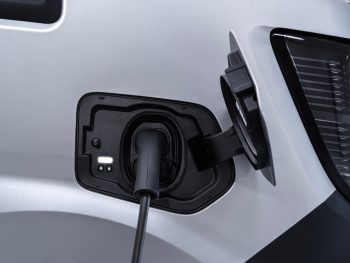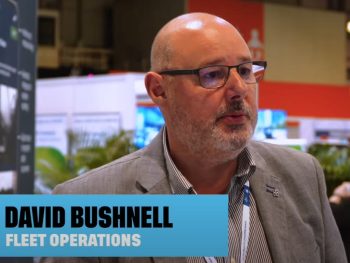Rachel Reeves, the UK’s first-ever female Chancellor, has delivered her inaugural Budget.
Labour’s first Budget in 14 years, the Budget announced £40bn of tax rises and vowed to improve public services.
The main points of interest for fleets are:
Freeze in fuel duty
The current fuel duty freeze and temporary 5p a litre cut will be maintained for a further year to support working people.

Fuel duty has been frozen at 57.95p a litre since 2011, reduced to 52.95p after the 5p a litre cut came into force in March 2022.
The Government also announced that it will introduce the Pump Watch mandatory fuel price publication and monitoring scheme from the end of 2025; the first time a date has been put on this.
David Bushnell, director of consultancy and strategy for Fleet Operations, said: “By maintaining the fuel duty freeze, the government offers predictable fuel costs, helping fleet managers control expenses and avoid passing on additional costs to customers.
Bushnell went on to say: “This is particularly advantageous for smaller operators, providing much-needed stability amid rising business expenses.”
More details are here.
A commitment to restoring the 2030 ICE-phase out
The Budget document reaffirmed Labour’s manifesto pledge to return to the 2030 ICE ban, phasing out new cars that rely solely on internal combustion engines by the end of the decade and ensuring all new cars and vans sold in the UK will be zero emission from 2035.

The Budget also confirmed £2bn under the Industrial Strategy to support the automotive sector in increasing production of zero-emission vehicles alongside the continuation of tax incentives to support their introduction.
Reeves also confirmed plans to capitalise the National Wealth Fund, which would “invest in the industries of the future, from gigafactories to ports to green hydrogen”. And she announced £2bn of funding for 11 brand-new green hydrogen projects, across England, Scotland and Wales.
However, despite calls from across the sector, the Budget was lacking in measures to specifically tackle private buyer demand for EVs, either new or used.
Mike Nakrani, CEO of VEV, said: “The Government’s prior commitment to reinstating the 2030 ICE ban was a positive step to help realise the UK’s net zero targets. It’s good to see that pledge becoming reality along with the funding and incentives measures announced in the Autumn Budget.”
Double cab pickups to be treated as company cars for tax
Following a Court of Appeal judgement, the Government will treat double cab pickup vehicles (DCPUs) with a payload of one tonne or more as cars for certain tax purposes.
From 1 April 2025 for Corporation Tax, and 6 April 2025 for income tax, DCPUs will be treated as cars for the purposes of capital allowances, Benefit-in-Kind, and some deductions from business profits.
More details are here.
Freeze in VED first-year rates for fully electric cars
The Government also said it would change the VED first-year rates for new cars registered on or after 1 April 2025 to strengthen incentives to purchase zero-emission and electric cars, by widening the differentials between zero-emission, hybrid and internal combustion engine (ICE) cars.

The Autumn Budget confirmed new zero-emission cars will attract a £10 first-year rate when they are registered, and this will be frozen until 2029/30, while an adjustment to the Expensive Car Supplement’s price threshold is under consideration for a future fiscal event.
First-year rates for cars emitting 1-50g/km CO2 will rise from £0 to £110, while vehicles between 51-75g/km will increase from £20 to £130. First-year rates for all other cars will double.
Matthew Walters, UK head of consultancy services and customer value at Ayvens, said: “Vehicle excise duty for electric cars has always been inevitable, but the Government has widely maintained incentives to help steer drivers towards the cleanest models.
“However, we would have welcomed some adjustment to rates for light commercial vehicles – especially considering it has now been six years since the Government’s consultation about future tax treatment for vans.
“From next April, electric LCVs will be taxed the same as their petrol and diesel counterparts – something we’d urge the Chancellor to review given that fleets still face challenges with range, payload, towing capacity and operating costs.”
More details are here.
Plug-in Van Grant extended for another year
The UK’s Plug-in Van Grant (PiVG) will be extended for a further year, the Chancellor has announced, providing much-needed incentives for van operators to go electric.

The Autumn Budget document said the Treasury would provide £120m in 2025/26 to support the purchase of new electric vans via the PiVG and to support the manufacture of wheelchair-accessible EVs.
A spokesperson for the Zero Emission Van Plan said: “The extension of the Plug-in Van Grant provides welcome relief to a sector facing an uphill battle to meet ambitious decarbonisation targets. Many van operators are seeking to kickstart their transition to zero-emission vehicles, with cost just one of the key barriers blocking their path.
“Extending the grant is a positive step but will not supercharge the transition by itself. [This week’s] debate in Parliament about van electrification shows that the cross-sector Zero Emission Van Plan is gathering momentum. Its asks seeking increased fiscal support, improved charging and the removal of regulatory barriers are being heard by the people in the positions to make a difference.”
More details are here.
Reforms to employer National Insurance Contributions
Employer NICs will rise from 13.8% to 15.0% from April 2025, while the income threshold will be reduced from £9,100 to £5,000 per year. The rate change also applies to Class 1A rates for providing workplace benefits – such as a company car.
However, despite fears of changes to NI thresholds for employees, Reeves said rates would remain the same.
While the reforms to employer National Insurance Contributions (NICs) weren’t directly aimed at fleets, they do affect employers annual Class 1A NIC bills on company car and vans benefits.
Charging support
The Chancellor pledged an investment of more than £200m in 2025/26 to accelerate EV charge point rollout, including funding to support local authorities to install on-street charge points across England.

This will drive growth among the UK’s existing charging network, which currently stands at more than 70,000 public charging devices.
ChargeUK CEO Vicky Read said: “While frustrating that the £950m Rapid Charging Fund (RCF) was not reconfirmed, we welcome the announcement of £200m of public funding for charge points, which we understand is in addition to the existing Local EV Infrastructure Fund.
“We look forward to discussing how to maximise the impact of that funding with the Government in due course.”
Extra £500m pledged to tackle scourge of potholes
The Chancellor has promised an extra £500m for road maintenance in the next year to tackle the UK’s pothole plague.
Reeves said the nation’s potholes were an “all too visible reminder of our failure to invest as a nation” and pledged new funding to deliver on Labour’s manifesto commitment to fix an additional one million potholes a year.
More details are here.
No news on pay-per-mile road pricing
Despite rumours of reforms to vehicle taxation, there was no announcement on a move to pay-per-mile road pricing to plug the massive revenue gap from the switch to EVs.

Road pricing had been in the headlines for weeks due to rising speculation of an announcement in the Budget.
This followed comments from the head of the National Infrastructure Commission, Sir John Armitt, that a scheme is “inevitable”.
However, a spokesperson from the Government had already said this month: “We have no plans to introduce road pricing. We are committed to supporting our automotive sector as we transition to electric vehicles in order to meet our legally binding climate targets.”
Plus…
- The Van Benefit Charge and Car and Van Fuel Benefit Charges will be uprated in line with CPI from 6 April 2025.
- The Government is considering the responses to the recent consultation on the VAT treatment of private hire vehicle services, as well as the impact of the recent Court of Appeal judgment, and will respond to the consultation in due course.
- End to ‘contrived car ownership schemes’ planned via draft legislation relating to loopholes in current arrangements. The changes will take effect from 6 April 2026.
General fleet, leasing and automotive industry reaction
Gerry Keaney, BVRLA chief executive

“This was a complex budget at a difficult time. The increase to employers’ national insurance will have a substantial impact on businesses and their customers. The full scale of its impact will only be seen in time.
“For our sector, the Chancellor has left many challenges unresolved. As penalties to stay in ICE vehicles ramp up in line with the ZEV mandate, more needs to be done. The barriers relating to the rental sector, charging infrastructure, consumer education and the used EV market, all need close attention.
“The Budget did bring some green shoots of positivity, suggesting that the government is taking the UK’s transition to cleaner, greener vehicles seriously. The confirmation that the fair EV company car tax regime will be continued at least to 2030 is a positive step, supporting a vital contributor to the transition and a bright spot of success up to now. Extending the Plug-in Van Grant provides the sector with a much-needed boost.”
Paul Hollick, chair, Association of Fleet Professionals

“The big news in the Budget is the announcement on company car tax rates until 2030, something on which we have been campaigning for some time. With the massive swing towards electric cars seen in the fleet sector in recent years, there was perhaps an expectation that we would start to see benefit in kind begin to creep upwards and I these figures are probably at the lower end of our expectations. This new certainty around tax will, in our opinion, maintain the ongoing electrification of car fleets, especially in establishing a marked differential compared to hybrids. Similarly, the increased differential in first year tax rates for electric cars is to be welcomed although, being a one-off cost, will have a much more limited impact.
“The other major element is the surprise ongoing freeze in fuel duty when a removal of the five pence discount was widely predicted. Petrol and diesel prices are historically quite low but this remains good news for fleets who are working hard to keep their spending under control.”
Mike Hawes, SMMT chief executive

“The lack of substantive measures to support the new car market – in particular for electrified vehicles – is hugely disappointing.
“We welcome the extension of the Plug-in Van Grant and company car tax benefits, but these alone cannot drive the growth in demand needed.
“With the sector challenged to deliver the world’s most ambitious EV transition targets, achievement of those targets is in serious doubt.
“There must be an urgent review of the market and regulation, else the cost will soon be felt in reduced UK investment, economic growth and jobs.”
Peter Golding, managing director, FleetCheck

“For fleets, the Budget perhaps splits down into two sections – changes that have a direct and immediate effect, and those that are part of higher level, longer-term government strategy.
“Probably the most important examples of the first are the freeze in fuel duty and the announcement on company car benefit in kind until 2030. While it does bring some bring additional tax, the decision on company tax is welcome in that it should help to maintain impetus behind the whole electrification project. Also, while petrol and diesel pump prices are at a lower level than they have been for some time, there seems to be a recognition from government that both business and individuals need further protection. Both moves are very welcome.
“At a macro level, the Government would argue that this is a Budget about growth. This is obviously a long-term project but, if the chancellor’s strategy is effective, it will be very much good news for fleets. There has largely been a sense of inertia about the UK economy in the post-pandemic period and if the chancellor can restore a feeling of at least some dynamism during this parliament, that would be no small achievement.”
David Bushnell, director of consultancy and strategy for Fleet Operations

“[The] budget tries to maintain a balance between rising operational costs and has strengthened support for sustainable and efficient transport options.
“Overall, this Budget will have come as a relief to fleet operators.
“While businesses will face increased expenses, they can also benefit from stable fuel costs and improved infrastructure through road maintenance improvements.”

